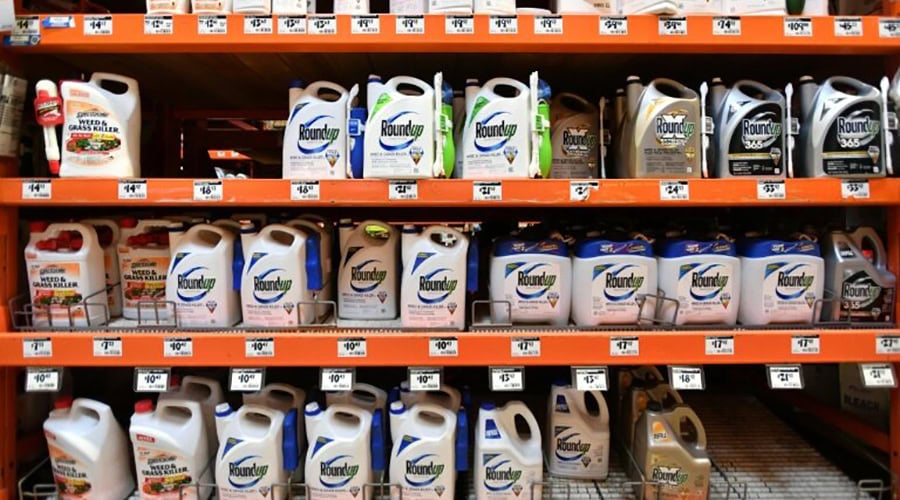Bayer has been on a rough road since it acquired Monsanto in 2018 for $63 billion. The combined company became the largest GMO and pesticide behemoth, on top of already being a pharmaceutical giant. Bayer believed it was on its way to even bigger profits… poisoning the planet and people, then selling the drugs needed to lessen the chronic suffering brought on by their toxic chemicals and unhealthy GMOs.
But things didn’t go quite according to plan.
Due to increasing public awareness and concern about the toxicity of glyphosate, the primary ingredient in Roundup weedkiller, the International Agency for Research on Cancer (IARC) reviewed published research and came to the determination that glyphosate is a probable human carcinogen. The 2015 IARC determination led to a tidal wave of lawsuits against Monsanto from users of Roundup who had developed non-Hodgkin lymphoma (NHL) and who were previously unaware of the dangers of the herbicide. “Safer than table salt,” Monsanto advertised.
Despite the impending Roundup-cancer trials, Bayer-Monsanto felt confident in its thorough corruption of the U.S. Environmental Protection Agency (EPA) and its ironclad support from the highest office in the land, with a White House domestic policy advisor saying in 2018, “We have Monsanto’s back on pesticides regulation. We are prepared to go toe-to-toe on any disputes they may have with, for example, the EU. Monsanto need not fear any additional regulation from this administration.” And let’s not forget the moron apologists that travel the world promoting Monsanto’s toxic products. “You can drink a whole quart of it and it won’t hurt you,” claimed Dr. Patrick Moore.
Bayer had just closed on the acquisition of Monsanto in June 2018, when the first case, Dewayne Johnson v. Monsanto, went to trial on July 9, 2018, in California state court. On August 10, a unanimous jury found Monsanto guilty and issued a landmark $289 million verdict.
Then came the trial of Edwin Hardeman v. Monsanto on February 25, 2019. On March 27, Bayer-Monsanto lost again with an $80 million unanimous jury verdict.
Then came the trial of Pilliod et al. v. Monsanto on March 28, 2019. On May 13, Bayer-Monsanto lost yet again in a $2 billion unanimous jury verdict.
The White House and the EPA may have had Monsanto’s back. But juries made up of real people weren’t buying Bayer’s deceit. Bayer’s stock value plummeted nearly 50 percent, with the number of lawsuits climbing to over 100,000.
The fourth case, Donnetta Stephens v. Monsanto, went to trial on Monday, July 26, 2021. Anybody want to place a bet on the verdict? Bayer-Monsanto is betting against itself. The corporation announced Thursday that it would stop selling glyphosate-based formulations of Roundup in retail stores as of 2023, despite continuing claims that glyphosate poses no harm to humans.
Bayer stated: “The company will also take additional steps to help close the door on this litigation and ensure that any claims brought by individuals who use Roundup™ in the future are few in number and unlikely to succeed. These measures include that the company and its partners will replace its glyphosate-based products in the U.S. residential Lawn & Garden market with new formulations that rely on alternative active ingredients beginning in 2023, subject to a timely review by the U.S. Environmental Protection Agency and state counterparts. This move is being made exclusively to manage litigation risk and not because of any safety concerns. As the vast majority of claims in the litigation come from Lawn & Garden market users, this action largely eliminates the primary source of future claims beyond an assumed latency period. There will be no change in the availability of the company’s glyphosate formulations in the U.S. professional and agricultural markets.”
What Bayer means to say is that they still refuse to admit any wrongdoing. And since the vast majority of the lawsuits are from residential users rather than professional landscaping companies and farmers, by removing glyphosate from the Roundup retail formulation, the company is attempting to minimize potential future glyphosate-cancer claims.
So in 2023, glyphosate-based Roundup will no longer be sold in stores such as Home Depot and Lowe’s. This is welcome news and a victory. And it happened because of activists and concerned people in the United States, and around the world, bringing this issue to the forefront of public conversation.
But glyphosate-based herbicides, and other toxic chemicals, will still be used in GMO and conventional farming, contaminating the organic food that many of us pay a premium for. Landscaping services will continue to use it on the properties of unsuspecting consumers and in cities that have yet to ban toxic synthetic pesticides, putting children and pets at risk. And we can’t forget that Bayer-Monsanto is a corporation with a lot of greedy and downright evil employees. They could very well have us playing whack-a-mole, replacing glyphosate with chemicals that are just as toxic or more dangerous for our health and the environment.
This is why We, the People, must keep sharing information and educating those that are still unaware. We need to keep pressing municipal, state and federal agencies and lobbying our elected politicians to remove all toxic synthetic pesticides from regular use in the U.S. The victims of Bayer-Monsanto and the agrichemical industry’s toxic products need to keep the lawsuits coming. And we need to speak with our wallets. Boycott GMOs. Boycott synthetic pesticides. Together, we will prevail.



Leave a Reply